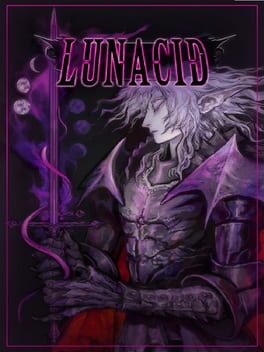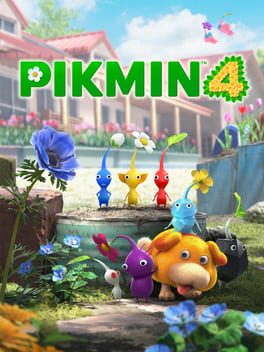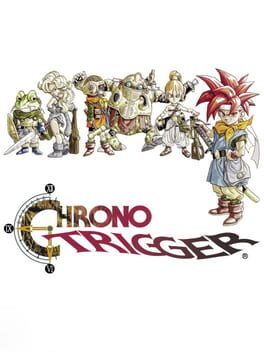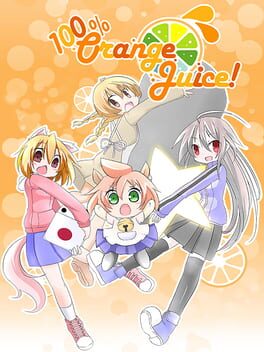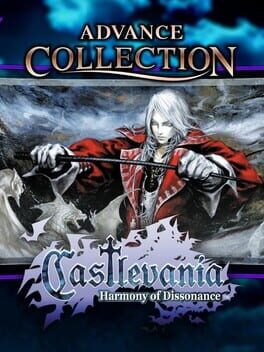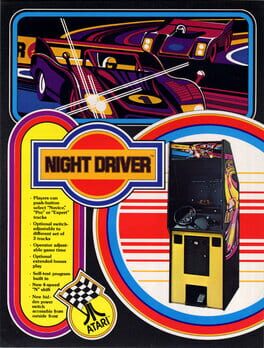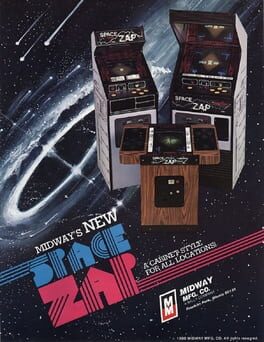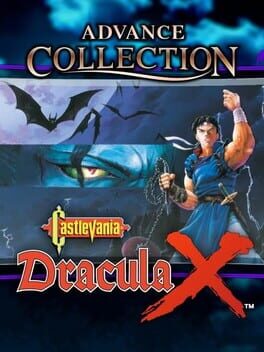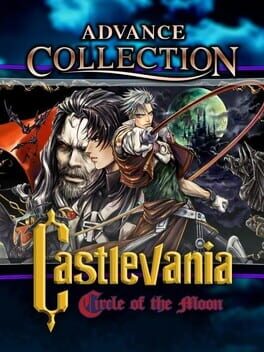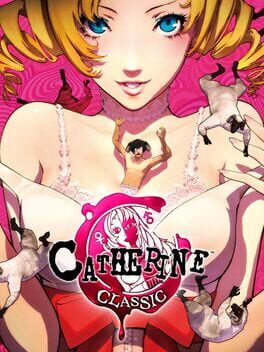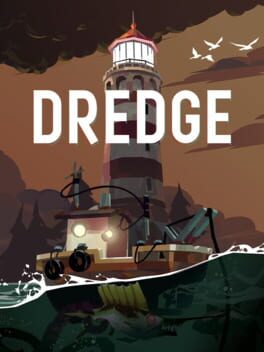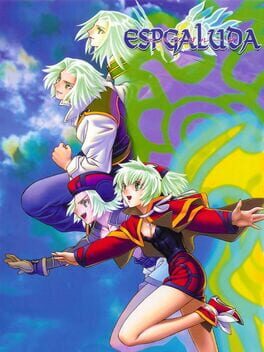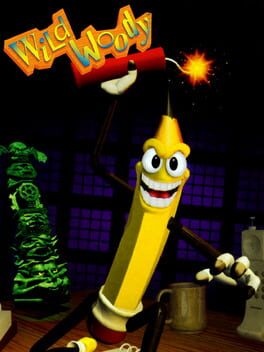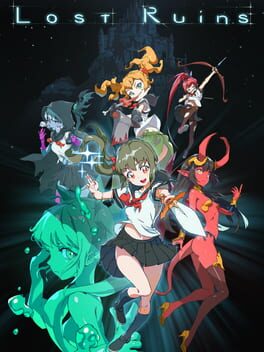woodoo
2022
I was a big fan of Kira's games before this one came out, so it was quite the pleasant surprise to learn they too were King's Field and Shadow Tower pilled. Lunacid not only does a beautiful job emulating the charm of its spiritual predecessors, it also modernizes and iterates on them in a clearly very passionate, loving, and respectful sort of way. Of course, it also has no shortage of its own ideas, and they really do give it a fresh, endearing identity. And goddamn is this game sweet— if I fell down its well I don't think I'd want to return either.
It's such a vibe to do some old school dungeon crawling to the tune of lo-fi, listen to the Banjo-Kazooie speak of an adorable little cast of characters, then shit myself when moments of this game are lowkey scarier than any horror game I've ever played. There's also not really a speed or jump height cap so far as I know, so if you wanna grind and turn the game into Quake, the world is your oyster. And don't get me started on all the cute little nods to some of my favorite game series, King's Field and Shadow Tower obviously, but off the top of my head, also Castlevania, Drakengard, Zelda, and Kira's other games of course! Shit, even the real life moon cycle buffs your in game magic, if that doesn't sell it I dunno what will.
I've always wanted to make a game like Lunacid, and seeing someone inspired by all the same shit I like honestly really inspires me. Given aspects of it can be a little obtuse I'm sure it won't be for everyone, but maybe give it a shot if it's a rainy day (or preferably, full moon) and looks like your thing!
It's such a vibe to do some old school dungeon crawling to the tune of lo-fi, listen to the Banjo-Kazooie speak of an adorable little cast of characters, then shit myself when moments of this game are lowkey scarier than any horror game I've ever played. There's also not really a speed or jump height cap so far as I know, so if you wanna grind and turn the game into Quake, the world is your oyster. And don't get me started on all the cute little nods to some of my favorite game series, King's Field and Shadow Tower obviously, but off the top of my head, also Castlevania, Drakengard, Zelda, and Kira's other games of course! Shit, even the real life moon cycle buffs your in game magic, if that doesn't sell it I dunno what will.
I've always wanted to make a game like Lunacid, and seeing someone inspired by all the same shit I like honestly really inspires me. Given aspects of it can be a little obtuse I'm sure it won't be for everyone, but maybe give it a shot if it's a rainy day (or preferably, full moon) and looks like your thing!
Review in progress:
Just to preface, this review includes both my actual final verdict and initial thoughts (from roughly 10 hours in) on the game. The latter of which obviously don't fully reflect my current thoughts on the game, but I do think first impressions are still important!
Final Review
While I don't think it'll be for everyone, any fan of existentialist sci-fi and anime will surely find 13 Sentinels to be a real treat. It's clearly a passionate love letter to many of my favorite stories, and whether intentionally or not also borrows a lot of great aspects from other works I like; Terminator, Bladerunner, Alien, The Matrix, Godzilla, Men in Black, NieR, Zero Escape, the list goes on, and I've really gotta respect how well the game does thematic justice to each of its inspirations. On top of that, the originality Vanillaware brought to the table here shouldn't be downplayed. Where 13 Sentinels may lack some degree of cohesion, payoff for its unique design decisions, it certainly makes up for in innovation. I've never played another game quite like it, nor experienced another story quite like it, and though I find said story falls short in a few areas, its resolute experimentalism should be applauded nonetheless.
As for what I loved— the things that kept me playing daily till completion, I would have to cite the aesthetics, the mystery, the mech fights and their banter, and most of the characters. As I stated in my initial review, this game is just so. fucking. pretty! Each background is a stunningly beautiful painting, warmly lit with a palette of striking, glowing hues. Each character sports a simple yet effective design, brought to life by expressive, endearing animations, and a brilliantly emotive voice cast (I went with the English dub, and would recommend it to even the most dedicated sub Andys). The soundtrack too always provides an amazing accompaniment to the action onscreen, and a number of the tracks were very memorable— the final battle theme is so very hype. I even kinda like the way the battles look, albeit I will say they sorely lack visual clarity, not the most conducive trait to such a complex tactical rpg.
As far as these battles go, despite my minor complaints with their presentation, they were by far one of my favorite parts of the game, and I'm honestly pretty surprised by how divisive they seem! For me, they strike a really cool balance between rts and turn based combat, and even though they're all holograms they still feel incredibly badass, surely in no small part due to the satisfyingly punchy sound effects and campy voice lines. There's a refreshing amount of depth in how you approach encounters, manage team compositions, and otherwise game the system to your advantage, but it also somehow never felt remotely overwhelming to me. 13 Sentinels does a phenomenal job easing players into its mechanics, and that's no easy feat with just how many systems there are. I do sort of wish their difficulty spiked up a little sooner than it did (for the record, I played on the highest difficulty all the way through and it generally felt pretty well tuned), but once you begin reaching the final encounters you really need to plan and improvise strategically, particularly if you want S ranks. I'm super stoked to go back for the optional encounters you unlock after beating the game, and it was honestly just a really pleasant surprise to see their inclusion in the first place!
Of course though, the brunt of 13 Sentinels' content is comprised of its narrative segments. In general, I enjoyed these for what they were, but I will also say that storytelling and writing were two aspects of the game I felt more mixed on. Without getting into spoilers, I need to express that this game's story is hella complex— its plot contains myriad twists and turns, an extensive array of sci-fi themes and vocab to unravel, and a decently massive cast of characters. On top of that, its story isn't presented the most digestibly, at least not until the last several hours perhaps. While I wouldn't necessarily call its level of convolution needless or pretentious, it's certainly self-indulgent, hard to recommend to anyone not immediately enthralled by the mystery of it all.
Where I think this game arguably falls short is in the payoff department; insane as its many reveals can be, I found a lot of them to feel like twists for the sake of twists, information that maybe didn't need as much fanfare as it got, or plot details that could have been left uncommunicated or altogether omitted without the story really losing anything. And weirdly enough, for just how many mysteries the game introduces, it strips back almost all of that mystique by its close, bluntly explaining away just about every instance of ambiguity. Maybe this is for the best though, for it can certainly be nigh impossible to follow basically anything for the first 20 hours, and it's hard to appreciate the incomprehensible. At least, I usually come to stories for their characters and meanings more than I do for their plots, and 13 Sentinels often seems primarily focused on its plot and worldbuilding in a way I think kind of de-emphasizes its themes, beliefs, and personalities.
Paragraph about the characters
Of course, the only reason I bring any of this up is because of how often this game is heralded as the pinnacle of storytelling. I find any discourse over whether a piece of media is "overrated" to be pretty unconstructive— the ways people feel about something don't dictate its quality, and calling anything overrated isn't a critique of that thing so much as it is a disparagement of taste. With that in mind, I still really enjoyed 13 Sentinels' story, but more so on the basis of it being a fun, pulpy, anime soap opera! It's kinda just a blast to unravel the sci-fi dictionary, watch the love-tridecagon unfold, decipher the crazy-ass lore bible. And there are definitely legitimately well realized themes and characters too! I particularly love all the philosophy surrounding cloning and neural implants— the idea that everyone is exactly who they are, and nothing can ever perfectly replicate one's individuality. It's also super cool there are no truly evil characters in the entire game; while some may be selfish or conniving, they're ultimately all just loving people with their own drives and motivations.
Conclusion
If you're reading this now, I do have quite a bit more to finish saying, though it's currently 4 am and Imma go to bed for the time being!
* * *
First Impressions
Pretty sure I'm only like 25% of the way through this beast, but I just wanted to get some initial thoughts out since it's been getting me to think a lot, and I've been enjoying my time with it pretty thoroughly! First off, this game looks and sounds gorgeous, and that's coming from someone who's generally not huge on anime artstyles! I'm a massive sucker for hand painted sprites and damn does Vanillaware deliver— the soundtrack goes insaneo style too. ALSO, I fw the mech combat hard, and I'd honestly be perfectly content if that's all 13 Sentinels was.
However, what I more so wanted to talk about was this game's narrative, an aspect of it I'm a little conflicted on, at least as of writing this. To specify, I'd like to speak more of its writing's quality than of my personal experience with it, because regardless of if it amounts to little more than pulpy anime bullshit, I can't lie, I've been getting quite a kick out of following the ludicrously convoluted paper trail. I think my final verdict on 13 Sentinels' story will be contingent on whether it uses its unconventional structure for something meaningful, or if it's just confusing for confusing's sake (and knowing the GOAT Yoko Taro praised it, I'm hopeful).
Something I'm a little confused by is the ratio of information 13 Sentinels leaves ambiguous to that which it just directly tells you. I'm usually a pretty big advocate for show-don't-tell, but when a piece of media throws 30 wacky new keywords at you every second, I think it's totally understandable and generally advisable to include some exposition, or even a glossary. 13 Sentinels is an anime mystery game so it obviously would fall into that camp, and does indeed compensate with a much appreciated and cohesive glossary (and at that, a pretty clever one in that you unlock entries as you go). However, for how happy the game is to leave you in the dark on major plot details, it can be surprisingly heavy handed when it comes to the more digestible ones.
For instance, in the scene that introduces Megumi (whose plotline has probably interested me the most so far), she's walking and talking with her friend Tomi, and then Tomi basically just turns to the camera and says "This is my good friend Megumi Yakushiji. She's always been the Hopeless Romantic character archetype, probably because she's so Shy personality trait." I'm exaggerating a little of course, but what I mean is that it feels really awkward and unnatural to blatantly exposition dump during a casual conversation between high schoolers, especially when that exposition is simply one of said student's personality, something that was already being established organically. Now, it's honestly very possible that the tropeyness of the cast is actually a highly intentional David Lynchian stroke of genius, but when the rest of Megumi's plotline consists of contracting with a talking cat to shoot witches with a magical gun in order to revive her deceased boyfriend from a different era, and none of THAT is explained, I'll admit this kind of thing feels a little off— probably just some clunky translation, idk. When basic information is so bluntly communicated in a story otherwise seemingly apathetic to one's understanding of it, there are times when it's hard to tell whether the game actually respects its players' intelligence.
At least, going directly into another time traveling RPG immediately after Chrono Trigger gives me a little whiplash. On one hand, I think complexity is great for a story, but it also needs to be earned, well placed. CT's story is instantly very effective because of its simplicity, but 13 Sentinels' seems much more of a slow burn. With that being said, I do really appreciate how the characters themselves generally don't seem to know what the fuck is happening either, and it makes them a lot easier to connect with. On the surface, they may all be defined by an archetypal personality trait and a like and dislike or two, but with the game's focus on story and its 40 some hour runtime, I'd have to imagine they go a little deeper than that once they're better established.
13 Sentinels is as niche as it is a vibe, and from what I can tell, its opening chapters are a weeb-level filter if nothing else. Since it's as well received as it is, I think I'll just have to swallow my pride and trust VW to cook, but nonetheless it's pretty damn fun. :)
Just to preface, this review includes both my actual final verdict and initial thoughts (from roughly 10 hours in) on the game. The latter of which obviously don't fully reflect my current thoughts on the game, but I do think first impressions are still important!
Final Review
While I don't think it'll be for everyone, any fan of existentialist sci-fi and anime will surely find 13 Sentinels to be a real treat. It's clearly a passionate love letter to many of my favorite stories, and whether intentionally or not also borrows a lot of great aspects from other works I like; Terminator, Bladerunner, Alien, The Matrix, Godzilla, Men in Black, NieR, Zero Escape, the list goes on, and I've really gotta respect how well the game does thematic justice to each of its inspirations. On top of that, the originality Vanillaware brought to the table here shouldn't be downplayed. Where 13 Sentinels may lack some degree of cohesion, payoff for its unique design decisions, it certainly makes up for in innovation. I've never played another game quite like it, nor experienced another story quite like it, and though I find said story falls short in a few areas, its resolute experimentalism should be applauded nonetheless.
As for what I loved— the things that kept me playing daily till completion, I would have to cite the aesthetics, the mystery, the mech fights and their banter, and most of the characters. As I stated in my initial review, this game is just so. fucking. pretty! Each background is a stunningly beautiful painting, warmly lit with a palette of striking, glowing hues. Each character sports a simple yet effective design, brought to life by expressive, endearing animations, and a brilliantly emotive voice cast (I went with the English dub, and would recommend it to even the most dedicated sub Andys). The soundtrack too always provides an amazing accompaniment to the action onscreen, and a number of the tracks were very memorable— the final battle theme is so very hype. I even kinda like the way the battles look, albeit I will say they sorely lack visual clarity, not the most conducive trait to such a complex tactical rpg.
As far as these battles go, despite my minor complaints with their presentation, they were by far one of my favorite parts of the game, and I'm honestly pretty surprised by how divisive they seem! For me, they strike a really cool balance between rts and turn based combat, and even though they're all holograms they still feel incredibly badass, surely in no small part due to the satisfyingly punchy sound effects and campy voice lines. There's a refreshing amount of depth in how you approach encounters, manage team compositions, and otherwise game the system to your advantage, but it also somehow never felt remotely overwhelming to me. 13 Sentinels does a phenomenal job easing players into its mechanics, and that's no easy feat with just how many systems there are. I do sort of wish their difficulty spiked up a little sooner than it did (for the record, I played on the highest difficulty all the way through and it generally felt pretty well tuned), but once you begin reaching the final encounters you really need to plan and improvise strategically, particularly if you want S ranks. I'm super stoked to go back for the optional encounters you unlock after beating the game, and it was honestly just a really pleasant surprise to see their inclusion in the first place!
Of course though, the brunt of 13 Sentinels' content is comprised of its narrative segments. In general, I enjoyed these for what they were, but I will also say that storytelling and writing were two aspects of the game I felt more mixed on. Without getting into spoilers, I need to express that this game's story is hella complex— its plot contains myriad twists and turns, an extensive array of sci-fi themes and vocab to unravel, and a decently massive cast of characters. On top of that, its story isn't presented the most digestibly, at least not until the last several hours perhaps. While I wouldn't necessarily call its level of convolution needless or pretentious, it's certainly self-indulgent, hard to recommend to anyone not immediately enthralled by the mystery of it all.
Where I think this game arguably falls short is in the payoff department; insane as its many reveals can be, I found a lot of them to feel like twists for the sake of twists, information that maybe didn't need as much fanfare as it got, or plot details that could have been left uncommunicated or altogether omitted without the story really losing anything. And weirdly enough, for just how many mysteries the game introduces, it strips back almost all of that mystique by its close, bluntly explaining away just about every instance of ambiguity. Maybe this is for the best though, for it can certainly be nigh impossible to follow basically anything for the first 20 hours, and it's hard to appreciate the incomprehensible. At least, I usually come to stories for their characters and meanings more than I do for their plots, and 13 Sentinels often seems primarily focused on its plot and worldbuilding in a way I think kind of de-emphasizes its themes, beliefs, and personalities.
Paragraph about the characters
Of course, the only reason I bring any of this up is because of how often this game is heralded as the pinnacle of storytelling. I find any discourse over whether a piece of media is "overrated" to be pretty unconstructive— the ways people feel about something don't dictate its quality, and calling anything overrated isn't a critique of that thing so much as it is a disparagement of taste. With that in mind, I still really enjoyed 13 Sentinels' story, but more so on the basis of it being a fun, pulpy, anime soap opera! It's kinda just a blast to unravel the sci-fi dictionary, watch the love-tridecagon unfold, decipher the crazy-ass lore bible. And there are definitely legitimately well realized themes and characters too! I particularly love all the philosophy surrounding cloning and neural implants— the idea that everyone is exactly who they are, and nothing can ever perfectly replicate one's individuality. It's also super cool there are no truly evil characters in the entire game; while some may be selfish or conniving, they're ultimately all just loving people with their own drives and motivations.
Conclusion
If you're reading this now, I do have quite a bit more to finish saying, though it's currently 4 am and Imma go to bed for the time being!
* * *
First Impressions
Pretty sure I'm only like 25% of the way through this beast, but I just wanted to get some initial thoughts out since it's been getting me to think a lot, and I've been enjoying my time with it pretty thoroughly! First off, this game looks and sounds gorgeous, and that's coming from someone who's generally not huge on anime artstyles! I'm a massive sucker for hand painted sprites and damn does Vanillaware deliver— the soundtrack goes insaneo style too. ALSO, I fw the mech combat hard, and I'd honestly be perfectly content if that's all 13 Sentinels was.
However, what I more so wanted to talk about was this game's narrative, an aspect of it I'm a little conflicted on, at least as of writing this. To specify, I'd like to speak more of its writing's quality than of my personal experience with it, because regardless of if it amounts to little more than pulpy anime bullshit, I can't lie, I've been getting quite a kick out of following the ludicrously convoluted paper trail. I think my final verdict on 13 Sentinels' story will be contingent on whether it uses its unconventional structure for something meaningful, or if it's just confusing for confusing's sake (and knowing the GOAT Yoko Taro praised it, I'm hopeful).
Something I'm a little confused by is the ratio of information 13 Sentinels leaves ambiguous to that which it just directly tells you. I'm usually a pretty big advocate for show-don't-tell, but when a piece of media throws 30 wacky new keywords at you every second, I think it's totally understandable and generally advisable to include some exposition, or even a glossary. 13 Sentinels is an anime mystery game so it obviously would fall into that camp, and does indeed compensate with a much appreciated and cohesive glossary (and at that, a pretty clever one in that you unlock entries as you go). However, for how happy the game is to leave you in the dark on major plot details, it can be surprisingly heavy handed when it comes to the more digestible ones.
For instance, in the scene that introduces Megumi (whose plotline has probably interested me the most so far), she's walking and talking with her friend Tomi, and then Tomi basically just turns to the camera and says "This is my good friend Megumi Yakushiji. She's always been the Hopeless Romantic character archetype, probably because she's so Shy personality trait." I'm exaggerating a little of course, but what I mean is that it feels really awkward and unnatural to blatantly exposition dump during a casual conversation between high schoolers, especially when that exposition is simply one of said student's personality, something that was already being established organically. Now, it's honestly very possible that the tropeyness of the cast is actually a highly intentional David Lynchian stroke of genius, but when the rest of Megumi's plotline consists of contracting with a talking cat to shoot witches with a magical gun in order to revive her deceased boyfriend from a different era, and none of THAT is explained, I'll admit this kind of thing feels a little off— probably just some clunky translation, idk. When basic information is so bluntly communicated in a story otherwise seemingly apathetic to one's understanding of it, there are times when it's hard to tell whether the game actually respects its players' intelligence.
At least, going directly into another time traveling RPG immediately after Chrono Trigger gives me a little whiplash. On one hand, I think complexity is great for a story, but it also needs to be earned, well placed. CT's story is instantly very effective because of its simplicity, but 13 Sentinels' seems much more of a slow burn. With that being said, I do really appreciate how the characters themselves generally don't seem to know what the fuck is happening either, and it makes them a lot easier to connect with. On the surface, they may all be defined by an archetypal personality trait and a like and dislike or two, but with the game's focus on story and its 40 some hour runtime, I'd have to imagine they go a little deeper than that once they're better established.
13 Sentinels is as niche as it is a vibe, and from what I can tell, its opening chapters are a weeb-level filter if nothing else. Since it's as well received as it is, I think I'll just have to swallow my pride and trust VW to cook, but nonetheless it's pretty damn fun. :)
2023
There are a few things I'm honestly not crazy about in Pikmin 4, yet these are all null under the Scrummy Bone Clause™. Oatchi and Moss are in this game and it gets 5 stars. Jokes aside, this game absolutely rocks on so many fronts— I just wish it was maybe a little bit harder, or at least less forgiving anyway (guess I must be a pikmin-racist). As nice as it is to rewind time immediately after your squad gets wiped by John Sheargrub, I kinda wish there was at least a difficulty option to turn that off since it really does remove the heart attack-inducing tension the series is known for. While I appreciate how cozy this entry can be, stakes are good for contextualizing your victories, particularly in a world as oppressive as Pikmin's. On that note, I'm also not the biggest fan of the busted-ass charge moves, overabundance of spicy spray, 3 pikmin type limit, Armored Core VI unbreakable lock-on, lackluster multiplayer mode, or glow pikmin segments (but to be honest, I won't get into those here— at the end of the day, this game was impossible for me to put down and I really don't care to shit on it more than I have).
As for what I do love about Pikmin 4, basically everything else! To no one's surprise, it is yet another stunningly beautiful Pikmin game, full to the brim with yet another massive cast of adorably terrifying little beasts. This goes for the whole series, but there's just something so healing about Pikmin's charm; all the cute little environmental details, the phenomenal sound design, the goofy idle animations the pikmin do when they aren't directly facing the horrors of war. All of it warms my cold, jaded heart. It is also by FAR the most expansive Pikmin title, there were like 4 separate occasions where I was sure it was over and the game just KEPT going. There's a huge variety of giant levels, refreshingly distinctive both in their visuals and gameplay. Within these are all manner of caves to explore, each offering a unique microcosm of what the game has to offer. On top of that, there's even an entire optional bonus campaign that I'm SO glad greedy Nintendo completely reasonably could have but didn't sell as a $20 DLC. It all closely held my interest for the 40-some hours I took to 100% it too.
I think out of everything (besides my good boy Oatch' of course), my favorite parts of Pikmin 4 were the extremely tightly designed timed challenge stages— quick excursions from the core loop where you have to do all of X before the evil moon crashes into PNF-404. Going for the platinum medals in these is REALLY fun, particularly in the harder ones. They really scratch the micromanaging itch that I've come to love in Pikmin, and I'm honestly not upset the rest of the game was more relaxed given their existence. And say what you want about my productivity irl, because I'm basically the Dandori King 😎. Anyhoo, play this OR ELSE.
As for what I do love about Pikmin 4, basically everything else! To no one's surprise, it is yet another stunningly beautiful Pikmin game, full to the brim with yet another massive cast of adorably terrifying little beasts. This goes for the whole series, but there's just something so healing about Pikmin's charm; all the cute little environmental details, the phenomenal sound design, the goofy idle animations the pikmin do when they aren't directly facing the horrors of war. All of it warms my cold, jaded heart. It is also by FAR the most expansive Pikmin title, there were like 4 separate occasions where I was sure it was over and the game just KEPT going. There's a huge variety of giant levels, refreshingly distinctive both in their visuals and gameplay. Within these are all manner of caves to explore, each offering a unique microcosm of what the game has to offer. On top of that, there's even an entire optional bonus campaign that I'm SO glad greedy Nintendo completely reasonably could have but didn't sell as a $20 DLC. It all closely held my interest for the 40-some hours I took to 100% it too.
I think out of everything (besides my good boy Oatch' of course), my favorite parts of Pikmin 4 were the extremely tightly designed timed challenge stages— quick excursions from the core loop where you have to do all of X before the evil moon crashes into PNF-404. Going for the platinum medals in these is REALLY fun, particularly in the harder ones. They really scratch the micromanaging itch that I've come to love in Pikmin, and I'm honestly not upset the rest of the game was more relaxed given their existence. And say what you want about my productivity irl, because I'm basically the Dandori King 😎. Anyhoo, play this OR ELSE.
2018
This review contains spoilers
Wow, what an incredible game this is. I honestly can't believe I hadn't played it sooner, but damn am I glad I got around to it— in many ways it really does feel like a time machine, truly transcendent beyond its era, yet also a nostalgia capsule in equal measure. As it's practically a sibling to one of my all time favorite JRPGs, developed at roughly the same time as and sharing a lot of assets with Final Fantasy VI, I always knew I was gonna like this one, but not until playing it did I internalize just how deeply it would resonate with me. Chrono Trigger is a deeply sweet and sincere game, home to some of the most gorgeous art, music, and storytelling of not just its era (for which it was totally revolutionary of course), but the gaming medium as a whole.
For one, the time traveling narrative is brilliant not just for its uniqueness, but also for its simple execution. Instead of bogging you down with the boring intricacies of fictional physics and technology, it is no more than a fun gateway into all manner of wacky, aesthetically distinctive time periods. Going in, I thought these were just going to be the middle ages and the present day (which would have been more than cool enough might I add), but you can also visit an ancient magic civilization, a technologically advanced but desolate future, and even dinosaur times, 65,000,000 BC (though I don't think Jesus is canon in the game's universe lmao). All of this is of course accompanied by one of the greatest scores in gaming, as well as some fantastically fun art direction by the great Akira Toriyama (may he rest in peace). It all adds up to be such a cozy, endearing little adventure, and thankfully, certainly not one devoid of darker themes or stakes.
The only nitpick I have is with the game's combat: While the battle system is admittedly really fucking cool (and I GREATLY appreciate the lack of random encounters and grinding), I don't think it's quite deep enough or its animations concise enough not to wear out its welcome like halfway through the game. Even though there are only so many of them, the battles still do get monotonous after a certain point. With that being said, they FAR from ruin the game, and the fact I can still confidently give it a perfect score in spite of them should really speak to just how strong its strengths are. While personally, I think I still marginally prefer Final Fantasy VI over Chrono Trigger, I'm so happy to be able to place it directly behind it on my list of favorite games. To pass up such a masterpiece would be a colossal mistake.
For one, the time traveling narrative is brilliant not just for its uniqueness, but also for its simple execution. Instead of bogging you down with the boring intricacies of fictional physics and technology, it is no more than a fun gateway into all manner of wacky, aesthetically distinctive time periods. Going in, I thought these were just going to be the middle ages and the present day (which would have been more than cool enough might I add), but you can also visit an ancient magic civilization, a technologically advanced but desolate future, and even dinosaur times, 65,000,000 BC (though I don't think Jesus is canon in the game's universe lmao). All of this is of course accompanied by one of the greatest scores in gaming, as well as some fantastically fun art direction by the great Akira Toriyama (may he rest in peace). It all adds up to be such a cozy, endearing little adventure, and thankfully, certainly not one devoid of darker themes or stakes.
The only nitpick I have is with the game's combat: While the battle system is admittedly really fucking cool (and I GREATLY appreciate the lack of random encounters and grinding), I don't think it's quite deep enough or its animations concise enough not to wear out its welcome like halfway through the game. Even though there are only so many of them, the battles still do get monotonous after a certain point. With that being said, they FAR from ruin the game, and the fact I can still confidently give it a perfect score in spite of them should really speak to just how strong its strengths are. While personally, I think I still marginally prefer Final Fantasy VI over Chrono Trigger, I'm so happy to be able to place it directly behind it on my list of favorite games. To pass up such a masterpiece would be a colossal mistake.
2009
Once felt like playing this when my friends weren't on and managed to guess the password for a random online lobby on my first try (iirc, the lobby was called "doge crater", and the password was just "doge" lmao). Absolutely dominated both rounds I played might I add. Infinitely annoying as this weeb shit is, I'd be lying if I didn't say it was unreasonably fun, ideally with a few drunk friends at 3 AM. It's great to space out to, and the artstyle (particularly the colors, backgrounds, and UI) really reminds me of some of the Cool Math games I'd play in middle school. Highly recommend if you've got friends to play with and the anime doesn't instantly make you vomit. I think I like it more than Mario Party tbh.
This review contains spoilers
Castlevania: Harmony of Dissonance is clearly an ambitious games with a lot of neat ideas, and in fairness, it does partially follow through on its vision. It is the most expansive, open, and non-linear Igavania entry I've played thus far, and for a series that often requires, or at least heavily incentivizes finding one "correct" progression path among innumerable, this is a welcome change when it works. It's really refreshing to be given not just the ability, but the encouragement to devise your own route through the map, and though some enemies can be a bit spongy depending on the order you choose to explore, nothing felt quite so over tuned as to deter me from any particular decision. In general, you can commit to the direction of your imperative and be rewarded for it— if not with main path progression then at least with decently substantive optional content. What's more, the game even sports a Link to the Past style alternate map overlapping the initial castle, and while I don't exactly believe this works in its favor (as I will expand on later), for better or worse it practically doubles the game's content, and is nonetheless a cool twist revealed in a novel way.
Of course, I would also be remiss not to bring up this game's gorgeous visuals— Castlevania games have consistently looked great, and even if a bit oversaturated to me, Harmony of Dissonance is no exception. Alas, one shame of this title's aesthetics is its (perhaps somewhat titular) poorly arranged score— while some of the melodies themselves are still bops, all of them are compressed and bitcrushed into the ground, headache inducing chiptune on a system home to some of the best and most polished video game music to this day. Good soundtracks are in my eyes cornerstones to Castlevania, and while this entry's failure here is undeniably unfortunate, I also by no means see it as the game's main detractor.
Rather, I think Harmony of Dissonance is a game stretched far too thin. It is volumetric yet hollow, fluffed out by a frankly superfluous amount of long repetitive hallways with nothing meaningful in them. It has by far the most backtracking of any metroidvania I've played— while there are warp points, they are spaced ludicrously far apart, and mostly only discovered until the endgame. By the point they are unlocked, they will have been made largely obsolete, save perhaps for hunting down previously missed secrets and map completion. In terms of movement, if you thought Circle of the Moon's double-tap to sprint was bad, you will be sorely disappointed to find that Juste moves painfully slowly and rigidly, lest of course you mash the evade buttons repeatedly and incur a stress fracture. Upgrades are also few and far between, and really don't serve much more of a purpose than progression keys. There are few places to high-jump beyond the rooms that require you to. Even more of a let down is realizing that the alternate castle is almost exactly identical to the first, for though it features remixed enemy and item placement and different visuals, its architectural layout is EXACTLY the same. Of course, you will still likely have to explore every inch of both to beat the game, especially so if you wish to attain the true ending. Desolately empty corridors are simply not conducive to this title's gameplay, and regrettably, its moment-to-moment level design isn't its only uninspired aspect.
There are a total of 19 bosses in Harmony of Dissonance, and at least to me, very few of them are all that memorable. Reminiscent of, albeit inferior still to Dark Souls II's boss design philosophy, most of them are just big guys, at best, reused bosses and enemies from prior titles with maybe an extra little twist, at worst, larger and tankier versions of common enemies that do almost nothing to differentiate themselves otherwise. Who can forget such iconic designs as Max Slimer (big slime) and Peeping Big (big eyeball)? Some are even just marginally different forms of other bosses in the alternate castle: There are 2 minotaurs, 2 legions. Movesets are also typically quite sparse, and should the need arise, all of them easily trivialized by spamming dodges every time the boss takes a step. I wonder how much more interesting each of them would be had there only been half as many.
In terms of RPG elements, there's also nothing to write home about. Finding new gear and leveling up amount to nothing more than stat increases, and given the game's non-linearity, I'm kind of confused why these were in the game at all. Upon completing the game, players unlock Maxim mode, allowing you to play as Juste's cooler ninja rival. Funnily enough, this mode remedies almost all of my issues with the game by just removing numerous mechanics and significantly increasing the player character's move speed. Stats are removed, progression items omitted, all areas are opened from the start, and they are now balanced consistently and intentionally. One need only defeat all the bosses to complete the game, able to move freely about the map. I think it really cemented all the issues I have with the standard game mode, for to me, Harmony of Dissonance is plagued by bloat, sluggish, repetitive gameplay. Surely it's still worth a shot for those craving Castlevania, but in my experience it's hands-down the worst Igavania, if not the worst series entry I've played.
Of course, I would also be remiss not to bring up this game's gorgeous visuals— Castlevania games have consistently looked great, and even if a bit oversaturated to me, Harmony of Dissonance is no exception. Alas, one shame of this title's aesthetics is its (perhaps somewhat titular) poorly arranged score— while some of the melodies themselves are still bops, all of them are compressed and bitcrushed into the ground, headache inducing chiptune on a system home to some of the best and most polished video game music to this day. Good soundtracks are in my eyes cornerstones to Castlevania, and while this entry's failure here is undeniably unfortunate, I also by no means see it as the game's main detractor.
Rather, I think Harmony of Dissonance is a game stretched far too thin. It is volumetric yet hollow, fluffed out by a frankly superfluous amount of long repetitive hallways with nothing meaningful in them. It has by far the most backtracking of any metroidvania I've played— while there are warp points, they are spaced ludicrously far apart, and mostly only discovered until the endgame. By the point they are unlocked, they will have been made largely obsolete, save perhaps for hunting down previously missed secrets and map completion. In terms of movement, if you thought Circle of the Moon's double-tap to sprint was bad, you will be sorely disappointed to find that Juste moves painfully slowly and rigidly, lest of course you mash the evade buttons repeatedly and incur a stress fracture. Upgrades are also few and far between, and really don't serve much more of a purpose than progression keys. There are few places to high-jump beyond the rooms that require you to. Even more of a let down is realizing that the alternate castle is almost exactly identical to the first, for though it features remixed enemy and item placement and different visuals, its architectural layout is EXACTLY the same. Of course, you will still likely have to explore every inch of both to beat the game, especially so if you wish to attain the true ending. Desolately empty corridors are simply not conducive to this title's gameplay, and regrettably, its moment-to-moment level design isn't its only uninspired aspect.
There are a total of 19 bosses in Harmony of Dissonance, and at least to me, very few of them are all that memorable. Reminiscent of, albeit inferior still to Dark Souls II's boss design philosophy, most of them are just big guys, at best, reused bosses and enemies from prior titles with maybe an extra little twist, at worst, larger and tankier versions of common enemies that do almost nothing to differentiate themselves otherwise. Who can forget such iconic designs as Max Slimer (big slime) and Peeping Big (big eyeball)? Some are even just marginally different forms of other bosses in the alternate castle: There are 2 minotaurs, 2 legions. Movesets are also typically quite sparse, and should the need arise, all of them easily trivialized by spamming dodges every time the boss takes a step. I wonder how much more interesting each of them would be had there only been half as many.
In terms of RPG elements, there's also nothing to write home about. Finding new gear and leveling up amount to nothing more than stat increases, and given the game's non-linearity, I'm kind of confused why these were in the game at all. Upon completing the game, players unlock Maxim mode, allowing you to play as Juste's cooler ninja rival. Funnily enough, this mode remedies almost all of my issues with the game by just removing numerous mechanics and significantly increasing the player character's move speed. Stats are removed, progression items omitted, all areas are opened from the start, and they are now balanced consistently and intentionally. One need only defeat all the bosses to complete the game, able to move freely about the map. I think it really cemented all the issues I have with the standard game mode, for to me, Harmony of Dissonance is plagued by bloat, sluggish, repetitive gameplay. Surely it's still worth a shot for those craving Castlevania, but in my experience it's hands-down the worst Igavania, if not the worst series entry I've played.
1976
1980
Space Zap is conceptually very simple, but it is also one of the most viscerally satisfying arcade games I've played. You control a space station in the center of the screen, and have to angle a turret to defend yourself from enemy ships and their artillery. This game gets fast quick— it won't be long before your run turns into DDR, and you'll soon be slamming buttons to the point of finding callouses on your hands. Space Zap's explosions are loud and crunchy, and whenever you lose a life a magnitude 8 earthquake occurs somewhere in the world. The cabinet I played on at Galloping Ghost had all too visible burn in wherever flashing lights were prone to happen onscreen. Incredibly charming, do yourself the favor of playing it if you're ever blessed to find a machine.
Retro games are always kinda hard for me to review, but zamn, this shit especially lol. On one hand, Dracula X is aesthetically brilliant. Its pixel art is gorgeous, and each level is visually distinct, hand-painted. Accompanying each level is an absolute banger tune, this entry seriously might have the consistently best music of any Castlevania. There are also branching paths, multiple endings, and the badass new "item crash" system. This game has a cool coat of paint for sure, and I've really gotta commend it for that because I seriously wouldn't be able to stomach a second of it otherwise.
To preface, I'm actually quite a fan of retro games, and I find I'm usually able to excuse their often shoddy design in lieu of fun factor, artistic value, novelty. Games were new, and hella expensive. Difficulty and obtuse progression were how they lasted more than an afternoon, and there's nothing inherently wrong with that. Difficulty is powerful, and in my opinion really defines the gaming medium. This is the reason I pretty much never use save states anymore— a game loses its meaning without its intended oppression, tension.
Having said that, Dracula X does make me wish I wasn't so stubborn, for this game is distastefully rude, brutally mean, and hates everyone's guts, egregious even among classic arcade games. It feels like a Mario Maker level I would have made when I was 14, if Mario's movement was programmed in Scratch. Enemies camp the tops of stairways, each take 9 hits to kill, spawn inside you always, and knock you off every cliff. Every item you need to progress is dangled precariously over an instant death chasm or hidden under a random floor tile. You get three lives per level and losing them all sends you back to the start, so it's a good thing they're each long and riddled with bullshit when you're trying to get back to the boss. I like a good challenge, but this just has painfully unforgiving, unfair, inexcusable game design. Castlevania IV did everything so much better in my eyes, but I guess I can see how Dracula X would have a more masochistic appeal? I just don't think it's fun enough to make up for that, it's incredibly overtuned constantly.
Still by no means an awful game, and I do plan to check out Rondo. Just play at your own risk— it WILL give you a heart attack.
To preface, I'm actually quite a fan of retro games, and I find I'm usually able to excuse their often shoddy design in lieu of fun factor, artistic value, novelty. Games were new, and hella expensive. Difficulty and obtuse progression were how they lasted more than an afternoon, and there's nothing inherently wrong with that. Difficulty is powerful, and in my opinion really defines the gaming medium. This is the reason I pretty much never use save states anymore— a game loses its meaning without its intended oppression, tension.
Having said that, Dracula X does make me wish I wasn't so stubborn, for this game is distastefully rude, brutally mean, and hates everyone's guts, egregious even among classic arcade games. It feels like a Mario Maker level I would have made when I was 14, if Mario's movement was programmed in Scratch. Enemies camp the tops of stairways, each take 9 hits to kill, spawn inside you always, and knock you off every cliff. Every item you need to progress is dangled precariously over an instant death chasm or hidden under a random floor tile. You get three lives per level and losing them all sends you back to the start, so it's a good thing they're each long and riddled with bullshit when you're trying to get back to the boss. I like a good challenge, but this just has painfully unforgiving, unfair, inexcusable game design. Castlevania IV did everything so much better in my eyes, but I guess I can see how Dracula X would have a more masochistic appeal? I just don't think it's fun enough to make up for that, it's incredibly overtuned constantly.
Still by no means an awful game, and I do plan to check out Rondo. Just play at your own risk— it WILL give you a heart attack.
Given I haven't quite finished it at the time of writing (game hard), I don't quite get the hate surrounding this one. It's definitely clunky, probably quite a bit so compared to newer entries, but for me, Circle of the Moon is a great fusion between the things I like about classic Castlevania and presumably, the things I will like about "metroidvania Castlevania", this being my foray into that style of the series.
First off, I really fw this game's difficulty, tight as it is. While it's possible to grind for levels and recovery items, my goofy ass is stubborn and impatient, and I tend to run past encounters with spongy enemies. Often this leaves me high and dry for the boss fights, but I honestly can't say I don't get a sick kick out of that. Finally beating a tough boss after hours in the salt mines is a favorite feeling of mine.
Good music is another thing Circle of the Moon possesses in no short supply. Castlevania is full of bops in general, and this entry's no exception. Even the driest of exploration turns to mad vibes when met with the right tunes. Unfortunately, I think that exploration is where Circle of the Moon (and in fairness, a lot of other metroidvanias) can fall a bit short.
While this game offers solid level design and a lot of cool, useful things to discover, obtuse progression is a staple of its genre and not one it's exempt from. Often there is only one way or a few specific ways to go, and while this is relatively common in metroidvanias, it is no less egregious here. Circle of the Moon also occasionally lets you sequence break to an extent. This is certainly not a negative in of itself, but due to the game's sharp difficulty, it's totally possible to scrape yourself into a certain late game area like fifteen levels early, only to be met with an absolute brick wall of a boss fight. To be honest, I find this kind of thing sort of commendable, only in my case I did this on TWO separate occasions thinking it was the only way to go, having to painstakingly backtrack the entire length of it both times (AND IT'S A POISON SWAMP). I'm probably just stupid, but I'm admittedly still butthurt lol.
Overall, I've found Circle of the Moon to be an incredible time, just one I can't really recommend to everyone considering its fair share of retro game bullshit; sluggish movement, obtuse progression, and comically low item drop rates. With that being said, I think this version might have save states, so it's probably worth a shot if you're normal and don't mind using those. Formidable but fair vibes for sure.
First off, I really fw this game's difficulty, tight as it is. While it's possible to grind for levels and recovery items, my goofy ass is stubborn and impatient, and I tend to run past encounters with spongy enemies. Often this leaves me high and dry for the boss fights, but I honestly can't say I don't get a sick kick out of that. Finally beating a tough boss after hours in the salt mines is a favorite feeling of mine.
Good music is another thing Circle of the Moon possesses in no short supply. Castlevania is full of bops in general, and this entry's no exception. Even the driest of exploration turns to mad vibes when met with the right tunes. Unfortunately, I think that exploration is where Circle of the Moon (and in fairness, a lot of other metroidvanias) can fall a bit short.
While this game offers solid level design and a lot of cool, useful things to discover, obtuse progression is a staple of its genre and not one it's exempt from. Often there is only one way or a few specific ways to go, and while this is relatively common in metroidvanias, it is no less egregious here. Circle of the Moon also occasionally lets you sequence break to an extent. This is certainly not a negative in of itself, but due to the game's sharp difficulty, it's totally possible to scrape yourself into a certain late game area like fifteen levels early, only to be met with an absolute brick wall of a boss fight. To be honest, I find this kind of thing sort of commendable, only in my case I did this on TWO separate occasions thinking it was the only way to go, having to painstakingly backtrack the entire length of it both times (AND IT'S A POISON SWAMP). I'm probably just stupid, but I'm admittedly still butthurt lol.
Overall, I've found Circle of the Moon to be an incredible time, just one I can't really recommend to everyone considering its fair share of retro game bullshit; sluggish movement, obtuse progression, and comically low item drop rates. With that being said, I think this version might have save states, so it's probably worth a shot if you're normal and don't mind using those. Formidable but fair vibes for sure.
2019
Have yet to finish it at the time of writing due to its Baba is You approach to difficulty, but I think it’s safe to call Catherine one of the most unapologetically auteurial video games I’ve played. It’s absurdly unique— pretty much the only piece of media I can think of to cross block pushing with girlfriend cheating, and in that regard it’s extraordinarily well realized. Tense, mind bending escape sequences are so masterfully woven together and juxtaposed with chill, Yakuza style bar crawls. But just as Vincent’s nightmare towers crumble below him during his climbs, so too are his reprieves brief. When hanging out at the Stray Sheep, time passes as you talk to each character, check your texts, even take a hard earned slug of beer. A mantra of Persona 5 (for which Catherine was a tech demo) is “take your time”, but here alas you are afforded very little— it’s keep moving or die gruesome after all. But where our tragic protagonist has to suck this up with a pit in his stomach, his journey is hardly grueling from the player perspective (though it is REALLY fucking hard at times). Gameplay is tight and snappy, challenging but fair, so much so that it even attracted a small yet dedicated corner of the FGC. Combine that with its brilliant excellently paced writing and you’re in for a treat, just keep in mind one with both a high skill ceiling AND floor.
Why do tech demos always hit so hard?
Why do tech demos always hit so hard?
2023
This shit slaps man— I've honestly always thought a fishing horror game would be cool, and Dredge more than delivers in that regard. On top of its beautifully creepy Lovecraftian aesthetic and occasionally pretty tense gameplay, the experience Dredge offers is a surprisingly cozy one. Gameplay is simple yet satisfying, and with plenty enough depth (like from ocean) to keep it fresh (like from fish). Played through the main quest with my gf and had a grand old time, though I'm certainly considering going back for 100% on my own terms— there's defo quite a bit I missed. Highly recommend to any of you fish-heads out there.
2003
1995
2021
Review in progress:
In spite of being pretty heinous, this game has like, unreasonably polished sound design and visuals. I particularly like how the lighting works, as it's seemingly 3D in a 2D game. It's really cool when you walk over some floorboards and the light filters through the cracks, or reflects off a background detail in a realistic way. Gameplay is also super tight, and refreshingly challenging. I love all the immersive-sim style shit where you can light things on fire by destroying braziers and such.
Anyhoo, Woodoo signing off.
In spite of being pretty heinous, this game has like, unreasonably polished sound design and visuals. I particularly like how the lighting works, as it's seemingly 3D in a 2D game. It's really cool when you walk over some floorboards and the light filters through the cracks, or reflects off a background detail in a realistic way. Gameplay is also super tight, and refreshingly challenging. I love all the immersive-sim style shit where you can light things on fire by destroying braziers and such.
Anyhoo, Woodoo signing off.
